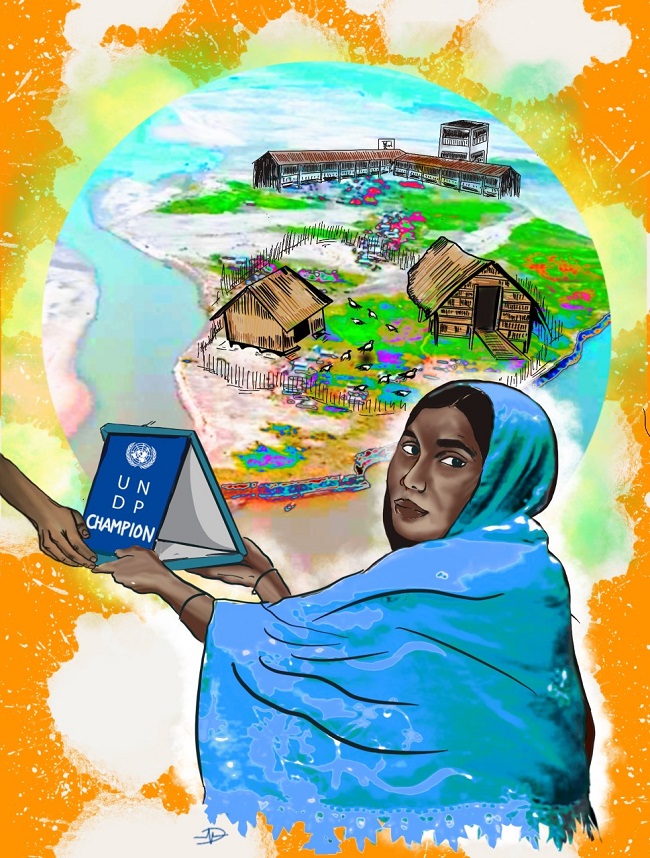Meet Shahida, and find out about her harrowing tale of climbing out of destitution, and pursuing of growth
Shahida, the Champion of Odds
July 18, 2022

From a far-flung village from Patuakhali, a coastal town of Bangladesh vulnerable to climate change, a young--married-- girl arrives in Dhaka. She is anxious-- will she find her husband, who fled the village due to crushing debt? And she had come all the way from the tiny, coastal town of Kalapara to the big city to find him and take him back. Her name is Shahida Begum, and little did little Shahida know back then that her name was going to be among leagues of true champions one day.
For now, little Shahida was just wrought with questions of basic survival. Where would she stay, and how would she find money, alongside her husband? At just 15 years, she arrived in Dhaka to also make money to pay off her husband's debt-- perhaps that would encourage his return. She employed her son for a 6000 taka ($70) salary job, and herself would sew quilts at night in order to pay for the rent where she lodged herself. In this way, she ground her way to 70,000 Taka ($742) within just 4 months, thus managing her debt money, and found and took her husband back to the village.
However upon repayment, once again she became penniless. After a series of unfortunate circumstances, she took shelter under the roof of a kind man living near a forest area
The population living in the adjacent forest area would usually use resources from the forest to earn a living, e.g. cut timber, sell honey, catch fish etc, and this would harm the forest’s ecosystem. As a result, there would be more hurricanes and landslides, endangering livelihood as well as lives. After all, Bangladesh is one of the most climate-vulnerable countries in the world.
To reduce the vulnerabilities and hazards of such extreme weather events, UNDP initiated a four-year project called ‘Integrating Community-based Adaptation into Afforestation and Reforestation (ICBA-AR) Programmes in Bangladesh and partnered with local organizations and municipalities to safeguard the forest, its resources and the families in the vicinity who managed livelihood from the natural resources.
The project offered financial aid and schemes to those afflicted by debt and loss of livelihood resulting from risks of residing in the high-risk coastal area. Shahida partnered up to acquire a 20,000 Taka ($212) loan and with that, UNDP helped her acquire 280 Khaki Campbell duck eggs. Khaki Campbell ducks bear about 280 eggs a year and are a resilient species in the Coastal area.
Little did Shahida, or anyone else at that point, truly know that this inspiring woman would rise from the ashes and become a community leader helping to safeguard destitute coastal-dwellers, as a result of this initiative.
Once she acquired the loan, she started off with 500 duck eggs. In three months of hatching, she sold the batch of ducks, earning her first lakh Taka on her very first run.
But this spirited woman had bigger visions-- to one day own and run her own farm. She kept ploughing back her net profits and a portion of her egg harvest, to invest in more eggs, later on for chicken as well. In only a couple of years, Shahida earned around 20 lakh Taka in total. Shahida had affirmed herself as a successful entrepreneur, running a profitable duck and chicken farm in the char.
However, finding financial security was not all Shahida succeeded in. The coastal areas, especially char lands, are frequently subjected to cyclones, floods, and storm surges due to the adverse impact of climate change. Around 35 million people who are living in 19 coastal districts of the country are at the highest level of climate risk.
Shahida decided it was not enough for her to live comfortably on her own. She expanded her vision and decided to use her earnings to help the people of the community she hailed from. She said, “People here are very poor and during these disasters, they suffer a lot, especially women and children.” Thus, she invested 14 lakh of her profits into building the first two-storeyed building in the char, with visions of it acting as a shelter house when cyclones and floods hit the coastal space. Shahida said, "No flood or hurricane will be an issue any longer, for the people of the char now have a shelter." Thanks to her building and a primary school– which Shahida helped facilitate– the people of the char now have shelter spaces when the climate bears down on them.
Today Shahida has taken up several roles as an active and coveted member of her community. As she is now an upstanding member of society Shahida uses her profile to arbitrate matters regarding child labour, dowry, violence against women, petty crimes et cetera. She is also a member of Galachipa’s union working on sexual violence against women. In short, she plays an integral role in arbitrating important community matters in Charfarma as well as adjacent villages. She has channelled her grit and skills for the greater good and has asserted herself as a changemaker helping a lot of people in need.
Shahida has come far from those days of sufferance and destitution. Her family no longer faces those dark days and is now busy giving back to the community.

 Locations
Locations

